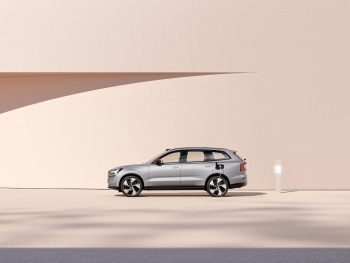Volvo launches new Energy Solutions business to build grid solutions
Volvo Cars has launched a new Energy Solutions business to pave the way for its electric cars to power houses and even the grid.

Volvo’s new Energy Solutions business unit will offer energy storage and charging-related technologies and services
The completely new business unit will offer energy storage and charging-related technologies and services, “embracing the wider climate potential of electric cars” and supporting the transition to a smarter, more sustainable and more efficient energy grid.
Volvo is working to become a fully electric car company by 2030 and its engineers have calculated that the arrival of millions of electric Volvo cars in the coming years will provide an electric fleet with a total battery capacity of around 50GWh by the mid-decade.
The new Energy Solutions business will explore how customers can “repurpose” energy stored in the battery of their electric Volvo, including through vehicle-to-grid (V2G) technologies, which enables energy to be delivered back to the power grid from the battery when the demand for electricity is higher – in return for compensation.
Its EX90 seven-seat electric SUV, due to start deliveries next year, will be the first Volvo car equipped with all the necessary hardware and – over time – software to enable V2G bi-directional charging and direct energy storage from solar.
Volvo has now teamed up with Göteborg Energi Nät AB, the local grid company in its Swedish hometown of Gothenburg, to launch one of the first V2G pilot programmes that aims to test such technologies on the local energy grid and in a home environment with real customers and using a low-cost AC wallbox to accelerate widespread adoption of the technology.
The pilot project not only aims to gain acceptance from a grid company and to demonstrate to other grid companies that V2G programmes can provide tangible benefits, but to create a testing arena for new technologies that are central to the future of Volvo Cars outside its labs.
Alexander Petrofski, head of the new Energy Solutions business, said: “With bi-directional charging, you can use your car battery as an extra energy supply, for example to provide power to your home, other electric devices or another electric Volvo car. The next step would be to enable this feature all around Sweden, and hopefully that will pave the way for even broader acceptance of similar charging and energy storage services around Europe.”
The new Energy Solutions business will also explore vehicle-to-load (V2L) services whereby the electric car battery can power camping gear or charge electric bicycles, for example.
Volvo added: “Over time, we anticipate Volvo Cars Energy Solutions will generate significant new revenues from energy-related products and services every year, as well as new products not previously offered by Volvo Cars. In doing so, Energy Solutions is set to add value to our core business, our customers’ daily lives and the environment.”

